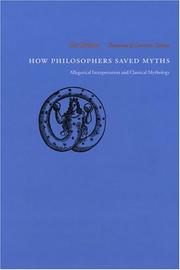| Listing 1 - 3 of 3 |
Sort by
|

ISBN: 1281959235 9786611959234 0226075389 9780226075389 0226075354 Year: 2004 Publisher: Chicago London : The University of Chicago Press,
Abstract | Keywords | Export | Availability | Bookmark
 Loading...
Loading...Choose an application
- Reference Manager
- EndNote
- RefWorks (Direct export to RefWorks)
This study explains how the myths of Greece and Rome were transmitted from antiquity to the Renaissance. Luc Brisson argues that philosophy was ironically responsible for saving myth from historical annihilation. Although philosophy was initially critical of myth because it could not be declared true or false and because it was inferior to argumentation, mythology was progressively reincorporated into philosophy through allegorical exegesis. Brisson shows to what degree allegory was employed among philosophers and how it enabled myth to take on a number of different interpretive systems throughout the centuries: moral, physical, psychological, political, and even metaphysical. How Philosophers Saved Myths also describes how, during the first years of the modern era, allegory followed a more religious path, which was to assume a larger role in Neoplatonism. Ultimately, Brisson explains how this embrace of myth was carried forward by Byzantine thinkers and artists throughout the Middle Ages and Renaissance; after the triumph of Chistianity, Brisson argues, myths no longer had to agree with just history and philosophy but the dogmas of the Church as well.
Mythology, Classical. --- Allegory. --- Philosophy --- Personification in literature --- Symbolism in literature --- Classical mythology --- History. --- Allegory --- Mythology, Classical --- History --- philosophy, philosophical, academic, scholarly, history, historical, allegory, allegorical, critical, critique, close reading, literary, literature, classic, classical, mythology, folklore, research, greece, greek, rome, roman, ancient world, antiquity, renaissance, oral, storytelling, tradition, moral, psychological, political, fables, metaphysical, middle ages, modern.
Book
ISBN: 0520954823 9780520954823 9780520275249 0520275241 9780520275263 0520275268 Year: 2013 Publisher: Berkeley University of California Press
Abstract | Keywords | Export | Availability | Bookmark
 Loading...
Loading...Choose an application
- Reference Manager
- EndNote
- RefWorks (Direct export to RefWorks)
In this book, ethnographer and poet Michael Jackson addresses the interplay between modes of writing, modes of understanding, and modes of being in the world. Drawing on literary, anthropological and autobiographical sources, he explores writing as a technics akin to ritual, oral storytelling, magic and meditation, that enables us to reach beyond the limits of everyday life and forge virtual relationships and imagined communities. Although Maurice Blanchot wrote of the impossibility of writing, the passion and paradox of literature lies in its attempt to achieve the impossible--a leap of faith that calls to mind the mystic's dark night of the soul, unrequited love, nostalgic or utopian longing, and the ethnographer's attempt to know the world from the standpoint of others, to put himself or herself in their place. Every writer, whether of ethnography, poetry, or fiction, imagines that his or her own experiences echo the experiences of others, and that despite the need for isolation and silence his or her work consummates a relationship with them.
Authorship. --- English language --- English literature --- American fiction --- Authoring (Authorship) --- Writing (Authorship) --- Literature --- Writing --- Writing. --- History and criticism. --- Germanic languages --- anthropology. --- art. --- artists. --- authors. --- dark night of the soul. --- empathy. --- engaging. --- ethnographer. --- ethnography. --- fiction writers. --- imagination. --- impossibility of writing. --- leap of faith. --- life experiences. --- literary criticism. --- literary. --- literature. --- lively. --- longing. --- magic. --- meditation. --- modes of understanding. --- modes of writing. --- modes. --- nostalgia. --- oral storytelling. --- poet. --- poetry. --- relationship. --- ritual. --- social science. --- students and teachers. --- unrequited love. --- utopia. --- worldliness. --- writing.

ISBN: 1281125504 9786611125509 0226167283 9780226167282 9780226167268 0226167267 9780226167275 0226167275 9781281125507 Year: 2003 Publisher: Chicago, Ill. University of Chicago Press
Abstract | Keywords | Export | Availability | Bookmark
 Loading...
Loading...Choose an application
- Reference Manager
- EndNote
- RefWorks (Direct export to RefWorks)
Signs and Cities is the first book to consider what it means to speak of a postmodern moment in African-American literature. Dubey argues that for African-American studies, postmodernity best names a period, beginning in the early 1970's, marked by acute disenchantment with the promises of urban modernity and of print literacy. Dubey shows how black novelists from the last three decades have reconsidered the modern urban legacy and thus articulated a distinctly African-American strain of postmodernism. She argues that novelists such as Octavia Butler, Samuel Delany, Toni Morrison, Gloria Naylor, Ishmael Reed, Sapphire, and John Edgar Wideman probe the disillusionment of urban modernity through repeated recourse to tropes of the book and scenes of reading and writing. Ultimately, she demonstrates that these writers view the book with profound ambivalence, construing it as an urban medium that cannot recapture the face-to-face communities assumed by oral and folk forms of expression.
American literature --- Postmodernism (Literature) --- African Americans --- City and town life in literature. --- African Americans in literature. --- Afro-Americans in literature --- Negroes in literature --- African American intellectuals --- African American authors --- History and criticism. --- Intellectual life. --- African Americans in literature --- City and town life in literature --- English literature --- Agrarians (Group of writers) --- Intellectual life --- African American authors&delete& --- History and criticism --- Thematology --- anno 1900-1999 --- african-american, literature, black, blackness, race, racism, subjectivity, postmodernism, print literacy, disillusionment, disenchantment, nonfiction, john edgar wideman, sapphire, ishmael reed, gloria naylor, toni morrison, samuel delany, octavia butler, book, reading, writing, oral storytelling, folk narrative, expression, urban, community, voyeurism, spectacle, information age, mediation, american south, heritage, belonging.
| Listing 1 - 3 of 3 |
Sort by
|

 Search
Search Feedback
Feedback About UniCat
About UniCat  Help
Help News
News